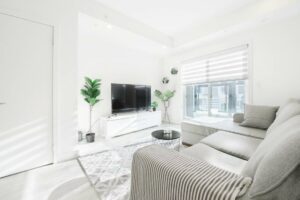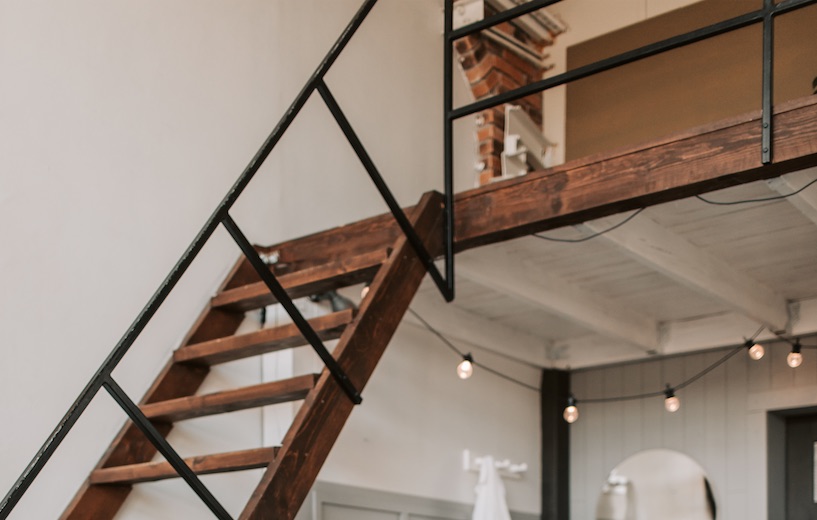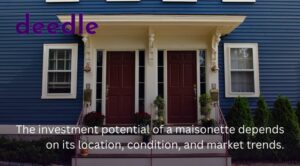Maisonettes are a type of housing that combines features of both houses and flats. They are usually arranged over two floors. These properties may be part of larger buildings, such as a converted house, or they could be standalone structures.
Across England and Wales, 21.7% (5.4 million) lived in a flat, maisonette or apartment. Known as duplexes in the U.S., maisonettes are a great option for people who enjoy city living but want more space than a traditional flat would provide. This guide explains what maisonettes are, and whether they might be a good choice for your needs.
How Are Maisonettes Different From Flats?
Maisonettes differ from flats primarily in their layout. While flats are usually single-story units within multi-story buildings, maisonettes are designed over two levels, often with a staircase connecting the floors.
Maisonettes often also have their own private entrances, which means they do not share communal hallways or entrances with other residents, providing a more independent and house-like living experience.
What’s the Difference Between Maisonettes and Duplexes?
‘Duplex’ is the American term for a maisonette. There is no difference, and they are both two-floored housing units with a single entrance, often with a staircase between the two floors.
What Types of Maisonettes Are There?
Traditional Maisonettes
These are two-story units, commonly in converted period houses, with their own private entrance from the street or a shared courtyard.
Ground Floor Maisonettes
Located on the ground floor, these units may have private gardens or outdoor spaces, making them highly desirable for those seeking direct access to outdoor areas.
Top Floor Maisonettes
Located on the uppermost levels of a building, these maisonettes might offer features like rooftop terraces or city views.
Are Maisonettes Leasehold or Freehold Properties?
Maisonettes can be found as either leasehold or freehold properties. This distinction depends on the ownership of the land and the building in which the maisonette is situated.
In leasehold properties, the homeowner owns the property itself but not the land it stands on. In contrast, freehold maisonettes grant the homeowner complete ownership of both the property and the land it sits on.
Are There Any Drawbacks to Living in a Maisonette?
Some maisonettes may have staircases, which could be inconvenient or less accessible for elderly individuals, people with mobility issues, or families with young children. Ground floor maisonettes may also face security concerns or lack privacy due to their proximity to the street.
Depending on the building’s construction, noise transfer between floors can be an issue. Maisonettes in city areas might have limited outdoor space, and top-floor units might lack private gardens or patios.
Are Maisonettes a Good Investment?
Yes they often are, but it depends on your needs. The investment potential of a maisonette depends on its location, condition and market trends.
Generally, maisonettes can be a good option for both first-time buyers and investors due to their unique layout, outdoor spaces, and potential for capital appreciation. However, it depends on how long you plan to live there, what your needs are, and where you want to live.
Can Maisonettes Be Converted Into Flats?
Yes. In some cases, maisonettes can be converted into flats or vice versa, depending on local planning regulations and the property’s structural layout. Converting a maisonette into flats might involve dividing the property into separate units, each with its own entrance and facilities.
Are Maisonettes Suitable for Families?
Yes maisonettes can be suitable for families, particularly those with older children or teenagers who value having separate living spaces on different floors. Ground floor maisonettes with private gardens can be especially appealing for families with young children or pets.
Do Maisonettes Have Their Own Utilities?
Yes, maisonettes usually have their own separate utilities including gas, electricity and water supply. Unlike flats in larger apartment buildings, maisonettes typically do not share utility metres or supply lines with other units.
How Do I Finance the Purchase of a Maisonette?
Financing the purchase of a maisonette is similar to buying any other property. Potential buyers can explore various options, such as a mortgage. The amount you can borrow depends on your income, credit score and the lender’s terms. Using personal savings or funds from investments can be a great way to contribute to the property purchase or provide a larger down payment, which may result in more appealing mortgage terms.
Shared Ownership schemes allow buyers to purchase a portion of the property and pay rent on the remaining share. Over time, additional shares can be purchased until full ownership is achieved.
Through Deedle, you can chat to a mortgage advisor for free. Simply request a quote and we will put you in contact with an expert advisor who can guide you through the whole process, from deciding on your finance option to handling the paperwork and negotiating with lenders.

Are Maisonettes Suitable for Elderly Residents?
Yes, they can be. Maisonettes may not be the most suitable option for older individuals or retirees with mobility issues, especially if the property has a staircase. However, ground floor maisonettes can be more accessible and may be appropriate for older individuals seeking single-level living.
When considering a maisonette for retirement, factors like the availability of local amenities, medical facilities and proximity to family and friends should be taken into account. You can opt to have measures fitted such as emergency buttons or a stairlift.
Can Maisonettes Be Rented Out to Tenants?
Yes, maisonettes can be rented out to tenants, whether they are leasehold or freehold properties. Landlords must ensure they comply with relevant regulations, such as getting appropriate licences and providing a safe and habitable living environment for tenants.
Concluding Thoughts
Maisonettes offer a unique and spacious housing option, combining elements of houses and flats. With their two-story layout, privacy, and potential outdoor access, maisonettes appeal to a wide range of buyers and renters. However, like any property, they come with their advantages and disadvantages, and potential buyers should carefully consider their individual needs and preferences before making a purchase.


